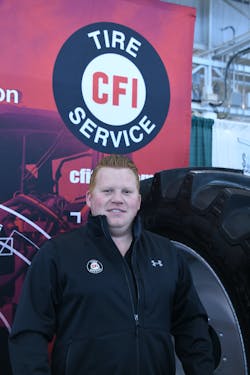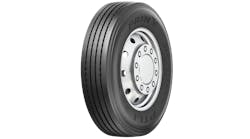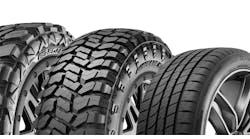When Clint Berardi asks growers if they understand increased flexion (IF) and very high flexion (VF) tire technology, the response is usually, “No.”
Berardi, who is a regional sales manager for his family’s dealership, CFI Tire Service Inc., is determined to change their response to, “Yes.”
“It is astounding to me because they are paying a lot more money for these tires, and the equipment is getting heavier,” he says. “That’s what really made it clear to me that there’s a lot more work to be done to educate these guys. The equipment is so expensive nowadays, and they need to take full advantage of everything they can get with commodity prices being so low.”
Berardi has worked in his family’s business since he was 14 years old. He’s now 30, with experience in the dealership’s service, sales and equipment dealer sales departments, where he works today.
CFI Tire Service serves the central Iowa agricultural community, as well as ag equipment dealers across the nation. The owners of the dealership are Berardi’s father, Dan, and his three uncles: Tim, Steve and Jeremy.
Dan works in sales in the wholesale division, which serves tire dealers across Iowa and northern Missouri. Steve provides inside sales and technical support for the company’s equipment dealer division, Jeremy heads up service locations in Des Moines and Ottumwa, and Tim is the company’s administrative officer.
Each store’s service area covers an 80-mile radius. The company operates a fleet of seven service trucks – five in Des Moines and two in Ottumwa – that provide 24/7 on-site tire repair and service.
The ag tire brands carried are Alliance, Firestone, Goodyear, Michelin, and Titan. The company offers tires and tracks for tractors, sprayers, combines, grain carts and all implements, with a specialization in tires for high-horsepower large machinery.
Sales and service of ag tires represent 80% of CFI Tire Service’s business. The remainder is made up mainly of construction, commercial, forklift and OTR tires, with a small amount of ATV, lawn and garden tires. The company also retreads commercial truck and small OTR tires and operates a wheel remanufacturing shop.
Education builds trust
Berardi devotes much effort to educating growers about the benefits of IF and VF technology, especially for reducing compaction and boosting yields. His goal is to help customers get the most out of their tires.
“Equipment keeps getting bigger and keeps going faster,” he says. “It’s almost to the point where IF/VF technology is going to become standard tires on equipment. IF/VF tires will be needed to handle the weight of the new equipment right from the factory. We are already seeing that with the sprayers and combines out there now. They’re getting so big and so heavy that they’ve got to have these tires to handle the weight and speed.”
An IF tire is designed to carry the same load as a standard tire at 20% lower air pressure or carry 20% higher loads at the same air pressure. A VF tire can carry the same load at 40% lower air pressure or can carry 40% more load at identical pressure.
Lower air pressure is important as farm machinery gets bigger. Larger and heavier equipment helps growers boost efficiency and productivity. The drawback with old radial technology and bias tires is an increased risk of soil compaction, which can significantly impact crop growth and yield performance, according to Berardi.
Helping growers understand what they can achieve in their fields with IF/VF tires builds their trust in CFI Tire Service, he notes. In one instance, a customer contacted Berardi because the growth of some rows of corn in his field was stunted, while rows outside of his wheel tracks were not. The grower was using a four-wheel-drive tractor fitted with two sets of triple tires, a 120-foot-wide planter and a 120-foot-wide sprayer to farm approximately 6,000 acres.
“He’s got six tires and wheels wide going through the field, and the tractor is pulling the planter,” says Berardi.
“Once the crop came up, he would go through with his sprayer on those same wheel tracks. Those six rows in the middle were getting all kinds of tire traffic, and it was compacting the soil. He wasn’t getting full root growth and that was leading to stunted crops and smaller size ears of corn and shorter stalks. He could drive along the road and see a dip in the height of the corn where those wheel tracks were.”
A better solution
The customer was aware of IF/VF technology and reached out to Berardi, who devised a solution. “We converted the tractor tires to IF tires and put a new tire and wheel package on his planter,” he says. “The planter went from a super single truck tire to an Alliance flotation radial tire. The Alliance tire carries about half the air pressure of the truck tires he was using before.”
While this grower farms 6,000 acres, Berardi notes that smaller operations benefit from IF and VF tires, too. “The technology is there for smaller equipment,” he says. “When it comes time to replace tires or to order new equipment, growers can ask dealers what aftermarket tires will have a better footprint.”
For example, a new tractor may be set up to plant 30-inch rows for a corn crop, but the buyer wants to use it for sugar beets, a crop that requires a tire and wheel combination that plants 12-inch or 15-inch rows. In this situation, the buyer will trade the new tires on his just-purchased equipment for a changeover package that fits his application.
Livestock farmers need unique tire and wheel solutions, too. “A certain type of tractor is used for clearing manure from poultry barns,” says Berardi.
If a tractor from the factory is too tall for the poultry barns, “the farmer will ask us to come up with a tire and wheel package that will lower the tractor a few inches.”
CFI Tire Service sales reps always offer growers an IF or VF solution because the tires can carry more weight, run on less air pressure, resist stubble damage and increase fuel efficiency.
“An IF or VF tire is not always the cheapest option; it’s just a better solution,” says Berardi. “The tire’s going to last longer, it’s going to do less damage to the fields over time, and it’s going to ride better down the road because a radial technology tire is going to flex a lot better than a bias tire.”
Most growers are open to IF and VF technology for their primary equipment, such as tractors, combines and planters, he says. CFI Tire Service encourages them to use IF/VF tires for their implement equipment, too. “About all the major manufacturers are offering IF /VF technology for implement tires,” says Berardi.
A family success story
CFI Tire Service dates back to 1927, when Leonard Holt bought a Sinclair Oil gas station in Des Moines. He began selling tires for passenger cars in the early 1930s.
At that time, tractor tires had steel wheels. In the late 1940s, Harvey Firestone, founder of Firestone Tire & Rubber Co., had an idea to equip tractors with pneumatic rubber tires.
Holt “worked with farmers and Firestone to convert tractors from those old steel plate traction wedges to air-filled, rubber tires,” he says.
During World War II, one of Holt’s sons was stationed in Italy. He married an Italian woman and brought her to Des Moines after the war.
“My grandpa (Ben) needed a job,” says Berardi. “His part of Italy had been bombed and there wasn’t any work. The Holts sponsored my grandpa to come over and work in their family tire business.”
The family’s business was growing rapidly. In addition to auto service and repair, the company offered passenger, commercial, industrial and ag tire sales and service.
Ben married a woman from Des Moines named Ruth and raised seven children. Four of the boys and Ben worked for the Holt family until 1994. In 1994, the Holt and Berardi families divided the business. Ben Berardi and his sons — Dan, Tim, Steve and Jeremy — purchased the ag tire and wheel part of the business and moved to a new location.
The Holt family kept the automotive side of the business and eventually renamed it Hilltop Tire Service. They operate three stores in Des Moines that provide automotive and passenger tire sales and service today.
CFI Tire Service began operating in 1995, with a focus on serving the commercial, agricultural and industrial segments of the tire market in central Iowa. The company started in a 14,500-square-foot facility and added new buildings in Des Moines as it grew.
These were a 4,000-square-foot facility to house the dealership’s industrial division and truck suspension shop (added in 1997), a 34,000-square-foot building for its agricultural business (opened in 2004) and a 230,000-square-foot storage facility (opened in 2010).
The company also added wheel remanufacturing services and began retreading medium truck and OTR tires.
In 2010, CFI Tire Service merged with MaconWorth Ltd., a tire company owned by Leonard Holt’s grandchildren. The merger provided access to turf, ATV and trailer tires and established a new CFI Tire Service distribution and sales location in Hayward, Calif. In 2011, the dealership opened a full-service tire center in Ottumwa.
Ben is retired but “still checks in with us from time to time to make sure we are still keeping the lights on,” says Clint. Clint’s brother, Kyle, works for CFI Tire, as do nine cousins and a brother-in-law. The dealership employs about 80 people. ■




